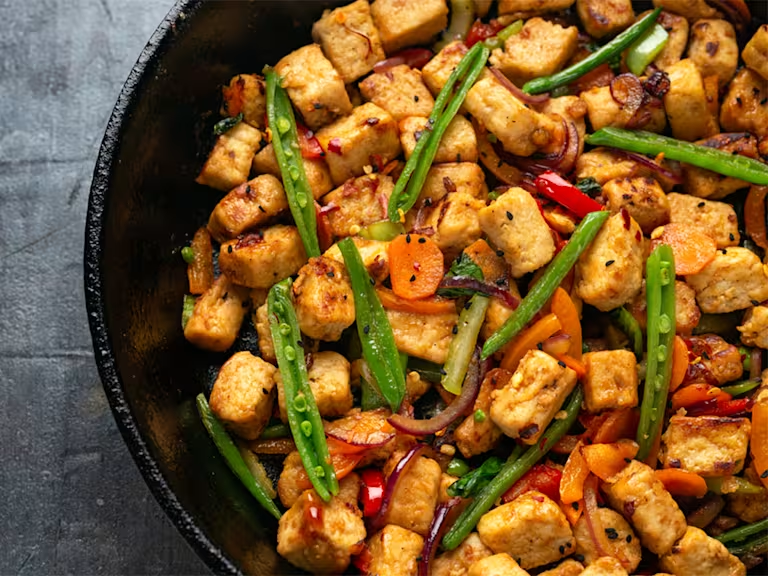
Why a Quorn mycoprotein Diet Won’t Leave You Hungry

Quorn mycoprotein is a unique, nutritious protein that helps to support a balanced diet. And while it may sound like a new revolution in sustainable food, Quorn mycoprotein has been around since the 1960s.
Quorn mycoprotein is a unique, nutritious protein that helps to support a balanced diet. And while it may sound like a new revolution in sustainable food, Quorn mycoprotein has been around since the 1960s. Often seen to be a meat alternative, this protein possesses many important benefits, with the main one being that it helps to regulate hunger and appetite, making it a great choice for those looking to lose weight or for those who want a more well-rounded diet to support their health and fitness.
What is Quorn mycoprotein?
Quorn mycoprotein is a high protein, high fibre, low-fat food ingredient derived from a natural unique fungus organism. In the early 1960s, experts were concerned that the predicted growth in the world’s population will lead to a global food shortage. This led researchers to investigate the feasibility of turning starch into a protein using some form of fermentation process. Using this fermentation process (similar to kefir or kombucha), although instead of being harvested in liquid form the micro fungus known as Fusarium venenatum is grown and collected in a solid form, the myoprotein is then successfully turned into a meat-free protein that can be part of a plant-based eating lifestyle. This tasty, high-protein and highly nutritional fungi-based protein is known as Quorn mycoprotein.
6 benefits of a Quorn mycoprotein diet
1. High nutritional value
Quorn mycoprotein contains all nine essential amino acids, including; histidine, isoleucine, leucine, lysine, methionine, phenylalanine, threonine, tryptophan, and valine. These amino acids are used by the body to help break down food, grow and repair muscle tissue, and assist with energy levels. Quorn mycoprotein also has these added nutritional benefits:
● Contains 6g of dietary fibre per 100g, of which 12% is soluble and 88% is insoluble.
● Provides more fibre per 100g than baked beans, brown bread, baked potatoes, and brown rice.
● Includes two fatty acids known to be essential for humans; alpha-linolenic acid (an omega-3 fatty acid) and linoleic acid (an omega-6 fatty acid).
● Contains no trans fats or cholesterol.
● Good source of zinc and selenium.
2. Keeps you feeling full for longer
Quorn mycoprotein has been examined for its potential to help regulate hunger and appetite. Early findings have suggested that diets which are rich in Quorn mycoprotein possess important benefits associated with appetite regulation. A number of studies have examined Quorn mycoprotein and its effect on satiety compared with other protein sources. Satiety is that sensation of being comfortably full and satisfied after a meal. Results of these studies show that Quorn mycoprotein appears to have a greater satiating power than other foods with similar fibre content. Quorn mycoprotein, therefore, has a fundamental impact on weight control, reducing the need to snack or reach for more carb-heavy foods to sustain energy.
3. Tastes similar to meat but a great alternative
Quorn mycoprotein has a meat-like texture, similar to chicken breast. In fact, Quorn mycoprotein’s appearance and structure has been shown to be very similar to animal-derived meat. Quorn mycoprotein’s structure is surrounded by fibre and consists of a unique food matrix which may act as a barrier for sugar absorption during digestion and improving sugar levels in the blood. Since Quorn mycoprotein is high in fibre and protein, suitable for all cultures, and with a similar taste to meat, it makes an excellent alternative to those seeking or needing a meat-free protein alternative.
4. Can benefit people with type 2 diabetes
There has been some research into the benefits Quorn mycoprotein may have on people living with Type 2 Diabetes. 1 out of 20 people worldwide have Type 2 Diabetes, with South Asians being more prone to the disease compared to Europeans. Those living with the disease have higher blood sugar levels than normal, which can lead to long-term complications such as blindness, kidney disease and blindness. Regulating blood sugar levels is therefore important in order to keep levels within a normal range. A diet high in fibre and protein decreases blood sugar levels and appetite, therefore it is viable to believe Quorn mycoprotein - which is very high in both fibre and protein - can help maintain healthy blood sugar levels in those with Type 2 Diabetes.
5. Lowers cholesterol
Quorn mycoprotein is cholesterol-free. A 100g serving of Quorn mycoprotein contains just 85 calories. Of this amount, only 26 calories are contributed by 2.9g of total fat and 0.7g of saturated fat. Compare this to a cut of porterhouse steak which contains 11g of fat, over 4g of saturated fat and 84 milligrams of cholesterol, Quorn mycoprotein is the healthier choice. A diet low in fat, saturated fat and cholesterol decreases your risk of heart disease and stroke. Quorn mycoprotein is also lower in sodium, with 5 milligrams in every 100g serve. Most commercial meat substitute products like soy veggie burgers are high in sodium, which can increase your risk of high blood pressure.
6. Builds muscle faster than whey protein
A recent study has found the Quorn mycoprotein contained in Quorn® products has more than double the muscle building properties of traditional milk based proteins such as whey protein. Quorn mycoprotein contains 11g of high quality protein per 100g which provides ample amounts of dietary protein to support not only the needs of everyday life but the requirements that come along with regular exercise. By eating a diet higher in protein it is also easier to reduce your appetite and feelings of hunger. This is due to your body being able to reduce the level of ghrelin, a hormone that stimulates the feeling of hunger.
Start your nutritious journey
Quorn mycoprotein is a key ingredient in the Quorn product range. Expert Quorn chefs have skilfully found out how to get the very best out of this tasty protein, creating a range of ready meals, sausages, burgers and meat-free products. Quorn products can be integrated into your Quorn mycoprotein diet for a nutritious and highly beneficial dietary regime.




